A place to relax: how to organize a rest area
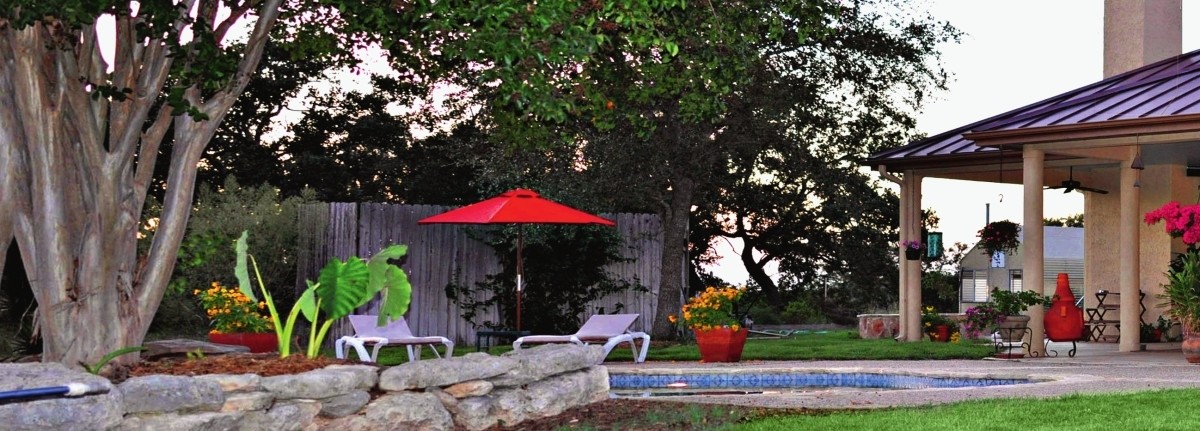
Summer is in full swing, which means it’s time to remember that we not only work on our land, but also relax there. And to adapt our land for these purposes as much as possible.
Ideally, the layout and zoning of the plot should be carried out at the preparatory stage. Still, it is never too late to make any changes, even the most radical ones. The main thing is not to forget that the result must take into account the characteristics of the territory and meet the needs of all family members.
Retro-style corner
This is the best way to describe a classic rest area for a 6,458.35-foot plot, most of which is taken up by vegetable beds and greenhouses. You can place a table and two benches here, nothing fancy, just simple and affordable.
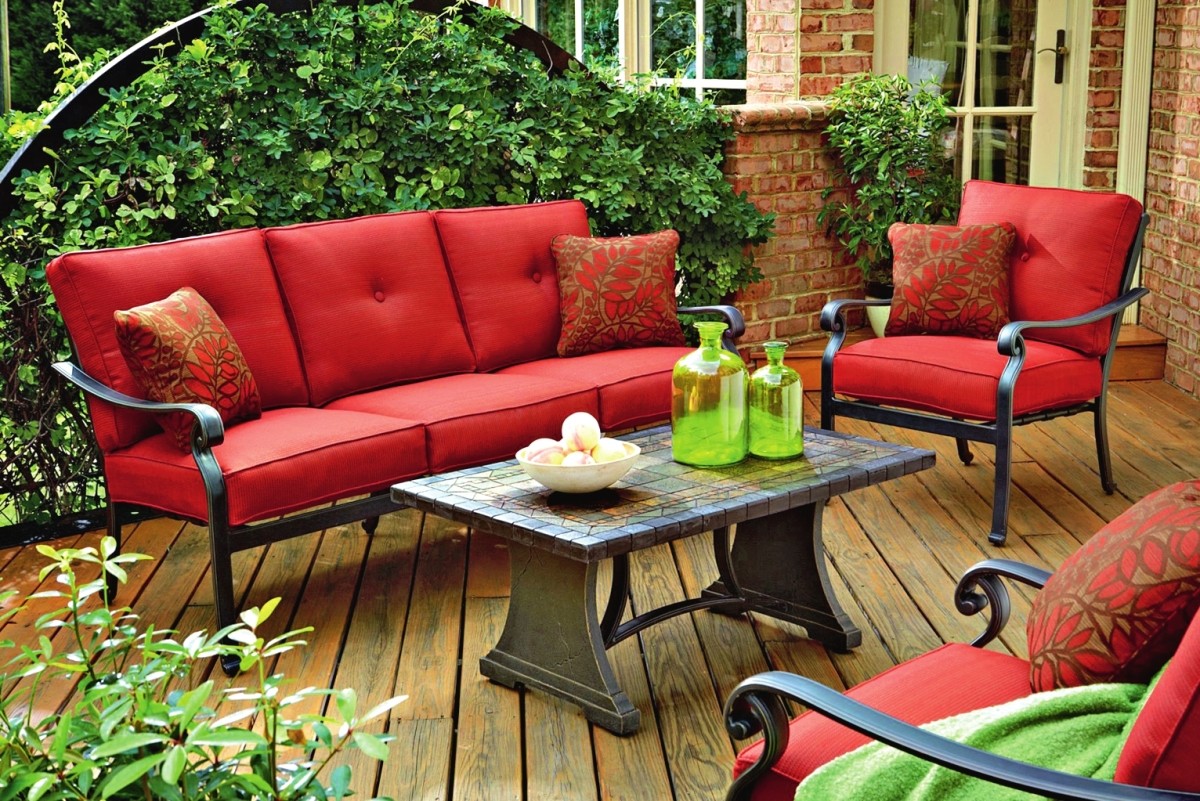
The design of the relaxation area can be quite minimalistic; the main thing is that you feel comfortable here.
But to make your vacation as comfortable as possible, even in such Spartan conditions, you should take into account several essential nuances:
- First, garden furniture should be arranged so that the sun’s rays do not reach any of the benches at any time of the day.
- Second, consider additional means of creating shade: for example, place a trellis under climbing decorative plants (grapes, clematis, hops, or beans).
- Third, if the site is located on a slope, could you level the area and build convenient steps to it?
Patio
A more stylish and luxurious option. And although the exact translation from Italian states that it is a “house without a roof,” nothing prevents you from modernizing it to your liking. For example, you could install a canopy or pergola in the corner, which will quickly be covered by grapevines, ivy, or climbing roses. Now you are guaranteed both beauty and protection from the scorching sun!
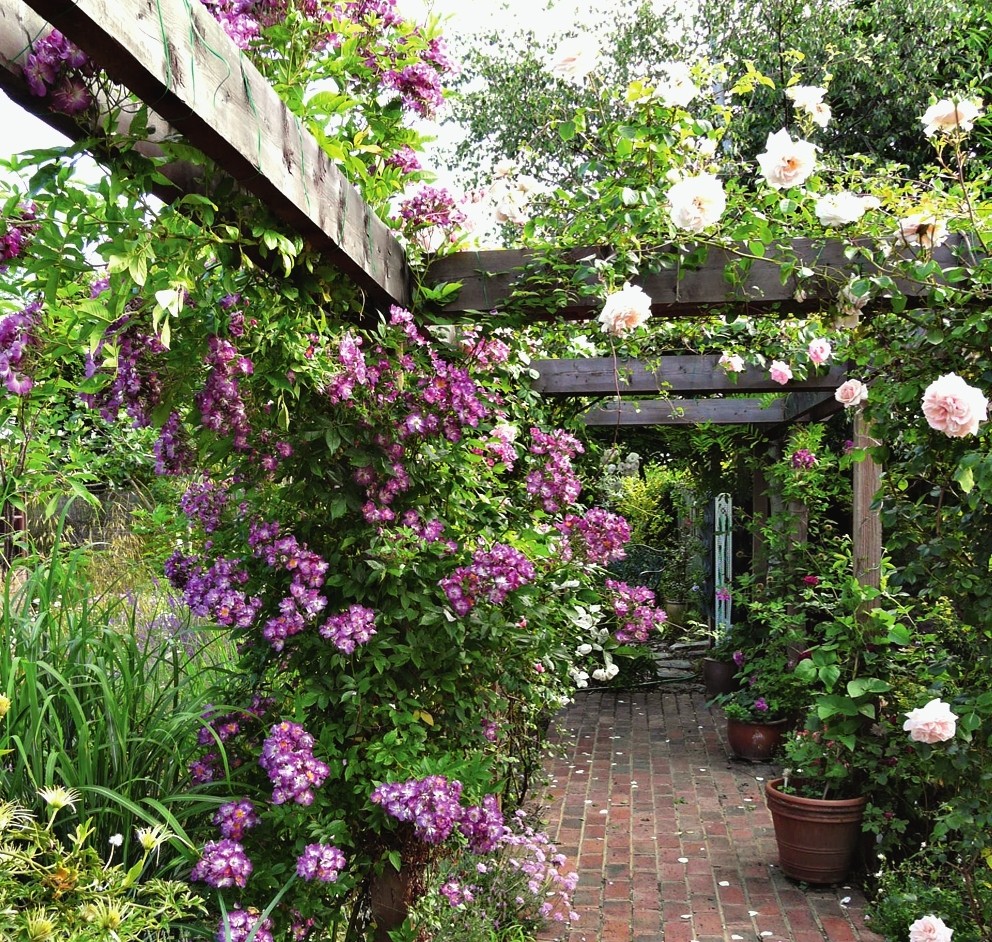
You can install a canopy or pergola in the corner.
How can you create this much-desired feature on your property?
1. First, could you determine the location? A flat area measuring between 43 and 97 square feet, open to sunlight and located next to the house, is best suited. You can use paving slabs, plastic modules, natural stone, thermowood, or brick for paving.
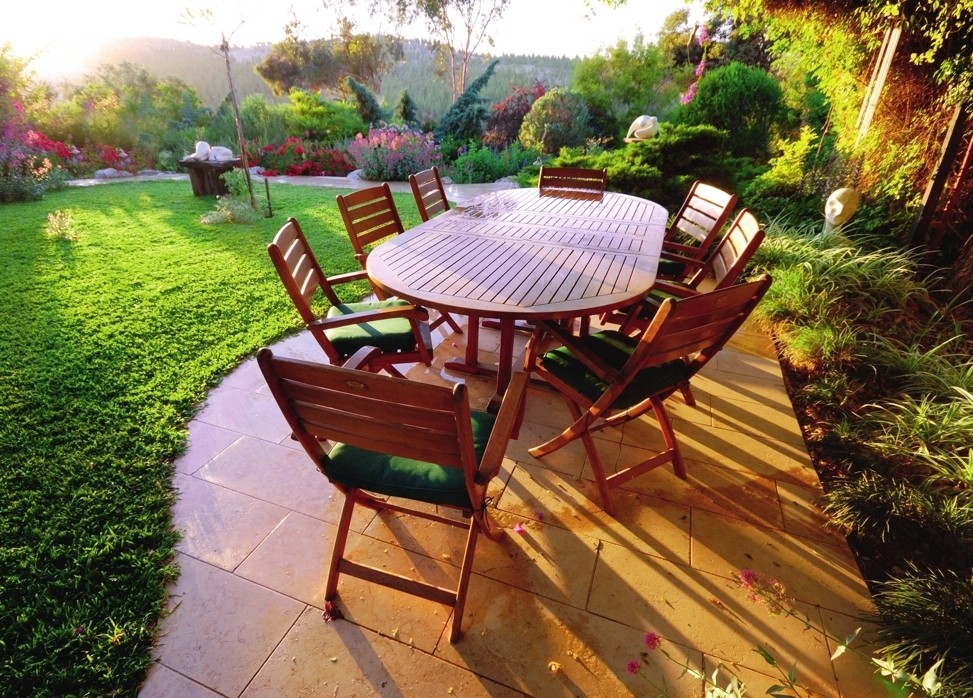
A flat area that is open to sunlight and located next to the house is best suited for a patio.
The area for the patio should be perfectly level, but with a slight slope, preferably along the shorter side, so that water can drain freely during rain.
2. Materials for the patio should be chosen based on their color, and this has nothing to do with the owners’ tastes, but instead with the desired speed at which the objects heat up. Dark-colored finishes heat up faster, while light-colored floors will remain cool all morning.
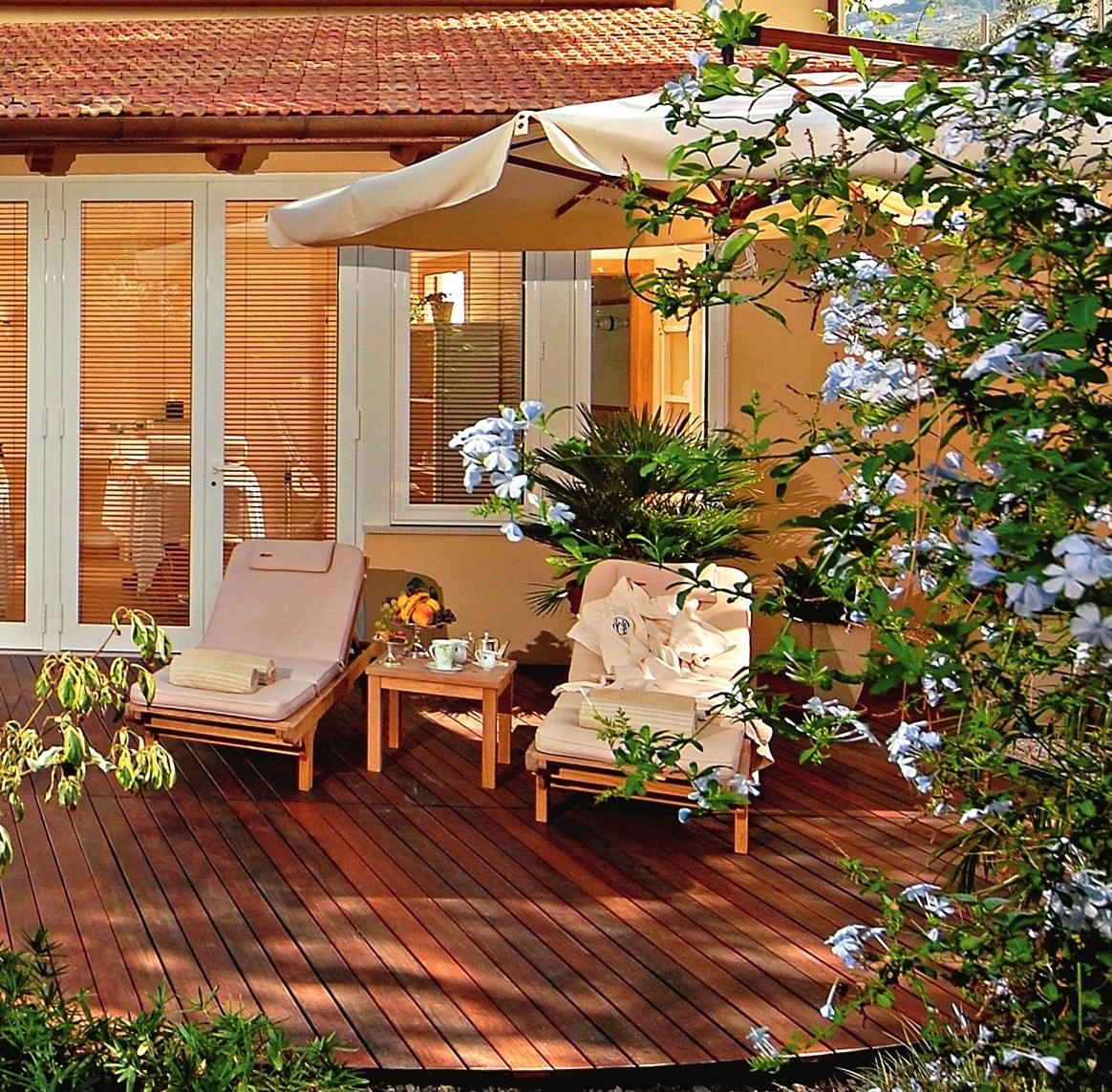
Plank flooring is just one option for flooring the patio adjacent to the house.
How to design a patio for a rest area
You can decorate your patio however you like, for example, by placing flower pots and tubs with small trees around the perimeter. The main thing is not to forget its true purpose: to create an atmosphere of security and give a feeling of comfort and bliss.
Overall, this intermediate zone, explicitly created for relaxation, serves two essential purposes: on the one hand, it expands the territory of the house and visually enlarges the living space, and on the other hand, it ties the home and garden into a unified ensemble.
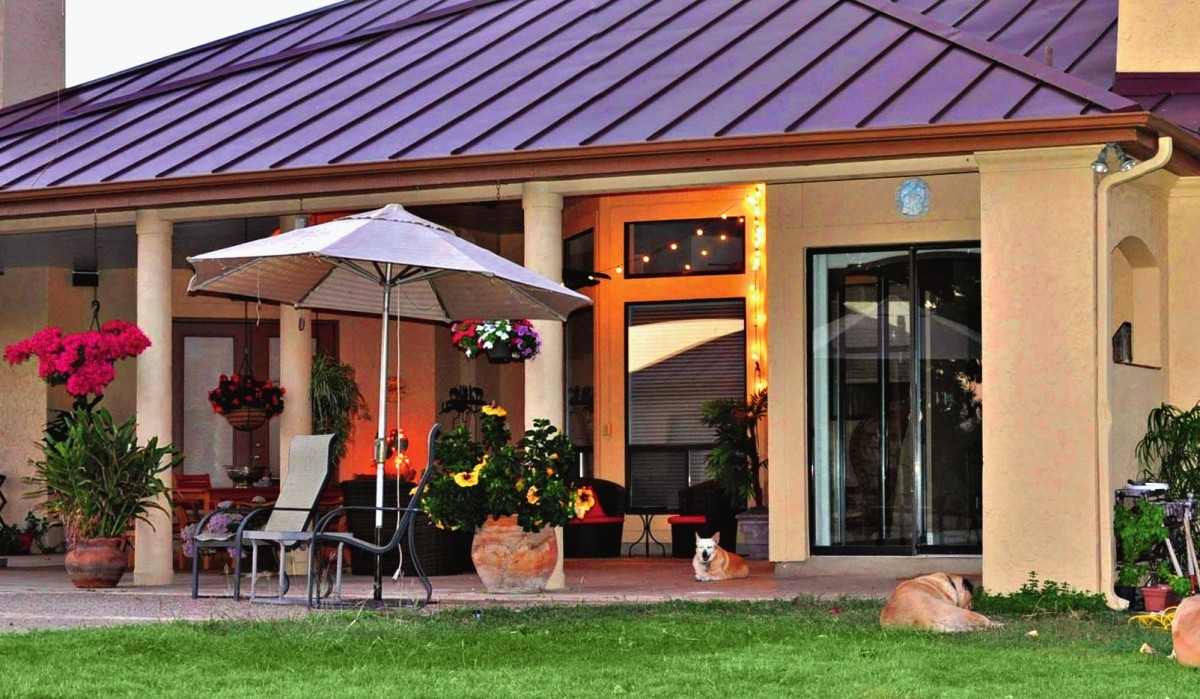
The intermediate zone between the garden and the house, created specifically for relaxation, serves essential purposes.
Necessary: do not build a patio near tall trees or a shaded wall of the house.
A practical solution is to combine a patio and gazebo in one design, for example, arrange them so that you can leave the house, walk through the patio, and immediately find yourself under the roof of the gazebo. In this case, you won’t have to divide the patio into a shaded and sunny side or install a canopy, and you’ll have a place to shelter from both the midday heat and sudden rain.
In cozy shade
A pergola covered with vines provides pleasant shade and can even protect you from light rain. The crowns of trees have the same properties. Resting under them is good for your health: pine needles release phytoncides, leaves and flowers release aromatic substances, and even the bark exudes an elusive aroma. Is it any wonder that the atmosphere under the canopy of a tree is full of romance and a special feeling of closeness to nature?
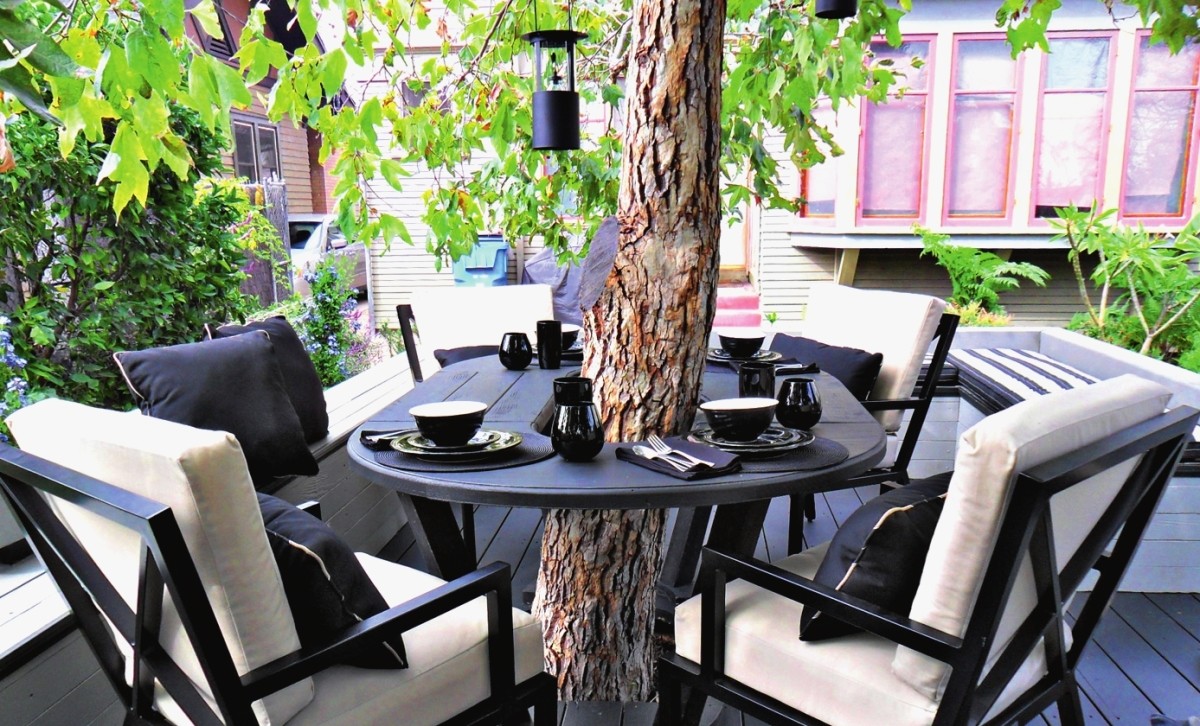
The atmosphere under the canopy of trees is full of romance and a special feeling of closeness to nature.
Gazebos
A gazebo is a more comfortable structure. Please place it in a location that offers a beautiful view of the entire site or its surroundings. Inside, you can put stationary benches and a table or any garden furniture that suits the style and parameters. The structure itself can also be original.
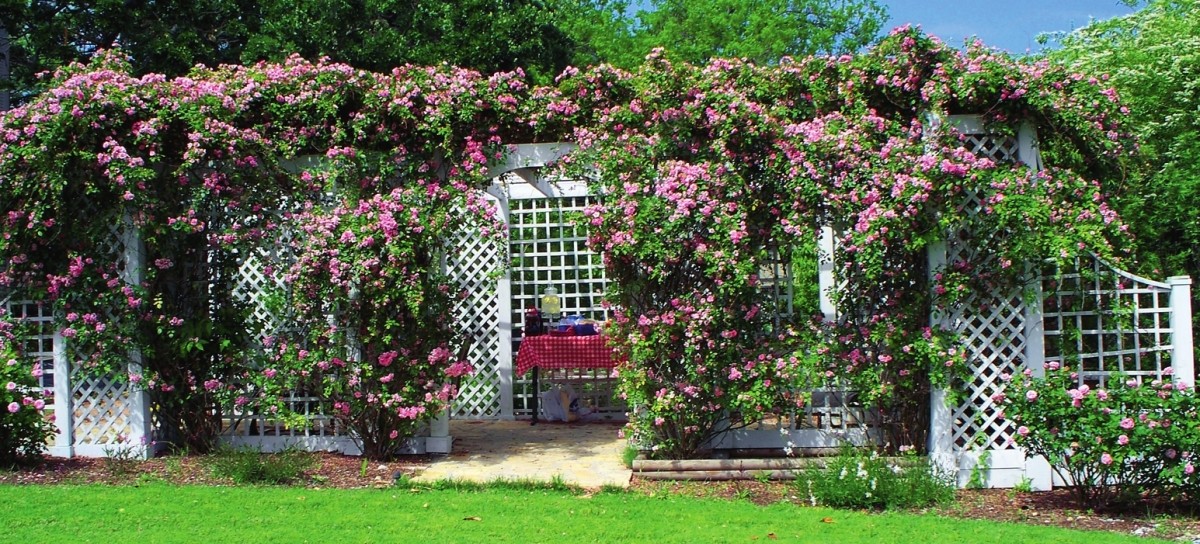
Open gazebo
- Open gazebos can have a lattice roof covered with green climbing plants, or they can be the end of an arch or trellis.
- Closed gazebos are often combined with a barbecue or garden oven, but this is no longer the romantic corner where you read poetry or make dates with your beloved woman by the light of dim lanterns.
Cover the walls from the inside with brightly colored honeycomb polycarbonate, even on a cloudy day. Your gazebo will be as bright as on a clear day, because the material miraculously multiplies even the most meager rays of sunlight. And rain will not penetrate such “protection.”
An equally interesting solution is a transparent roof, which can be made using the same polycarbonate. Transparent sheets will allow the sun’s rays to pass through best, while yellow or orange shades will give a feeling of warmth.
Tip: Please don’t place the gazebo close to trees or garden structures. There should be enough space to carry out painting, repair, and renovation work.
A modern approach
A gazebo does not necessarily have to be a polygon with a pointed roof. Here is a unique high-tech version—a multifunctional relaxation area that combines a kitchen with a barbecue, a dining area, a summer cinema, and even a mini-theater.
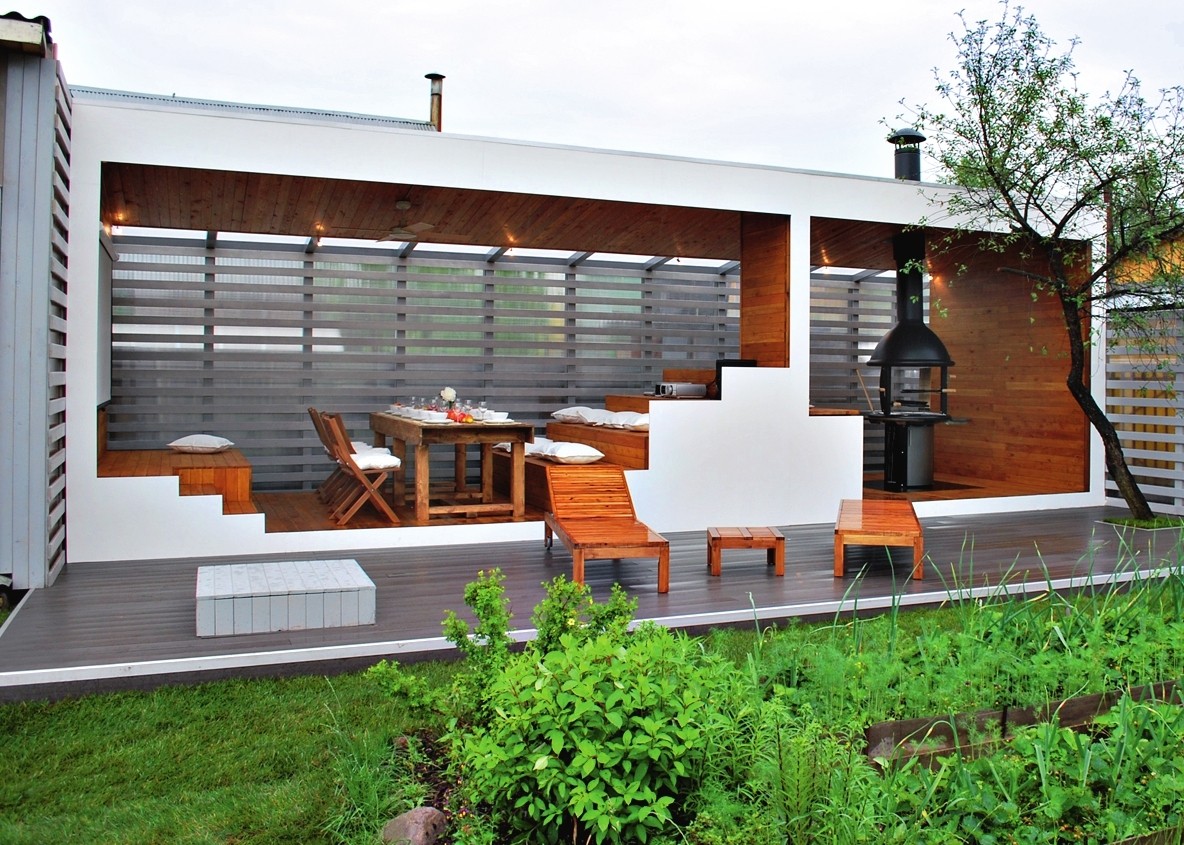
The space of the gazebo opens up into the plot and seems to enter into dialogue with the surrounding nature.
The structure is as open to sunlight as possible, but can be quickly shaded with drop curtains if necessary. The gazebo space opens up into the garden, seeming to engage in dialogue with the surrounding nature, thereby uniting the garden and home interiors.
A terrace with glass walls is an unexpected but quite effective solution. However, the furniture here should be as minimalist as the structure itself.
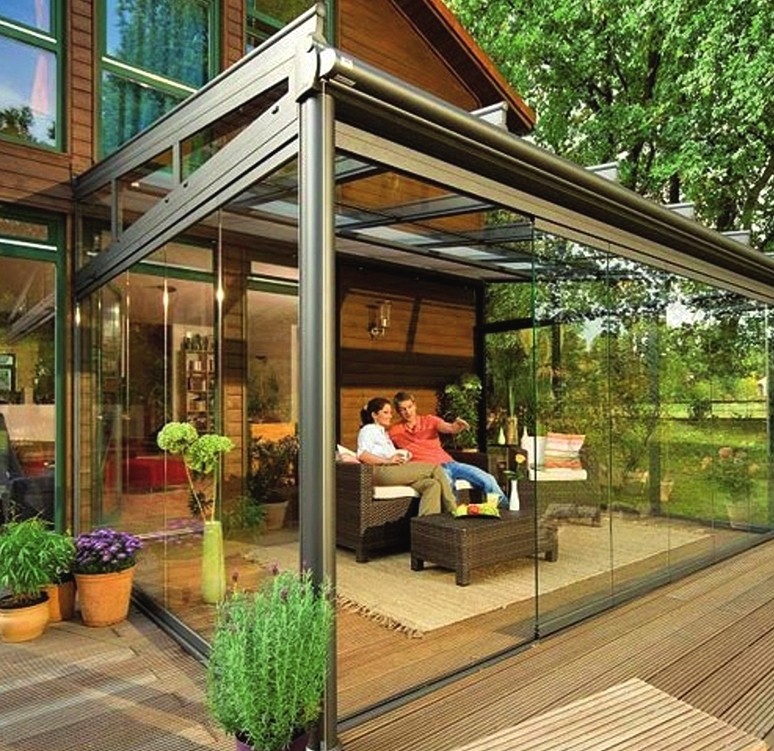
A terrace with glass walls—an unexpected but rather impressive solution.
A wooden gazebo must be treated with special solutions against pests, paints, varnishes, or linseed oil, which will protect the material from various mechanical deformations and premature aging.
A more elegant, yet more expensive, option is to use thermowood, which is resistant to weather conditions, has an excellent appearance, and is not attacked by wood-boring insects.
If the window frames are made removable, you will get a transformer gazebo: in summer, it resembles a colonnade, and in the cooler months of the year, a light garden pavilion. In this case, the grill, barbecue, and especially the barbecue oven installed inside this small room will serve not only for cooking on hot coals, but also for heating.
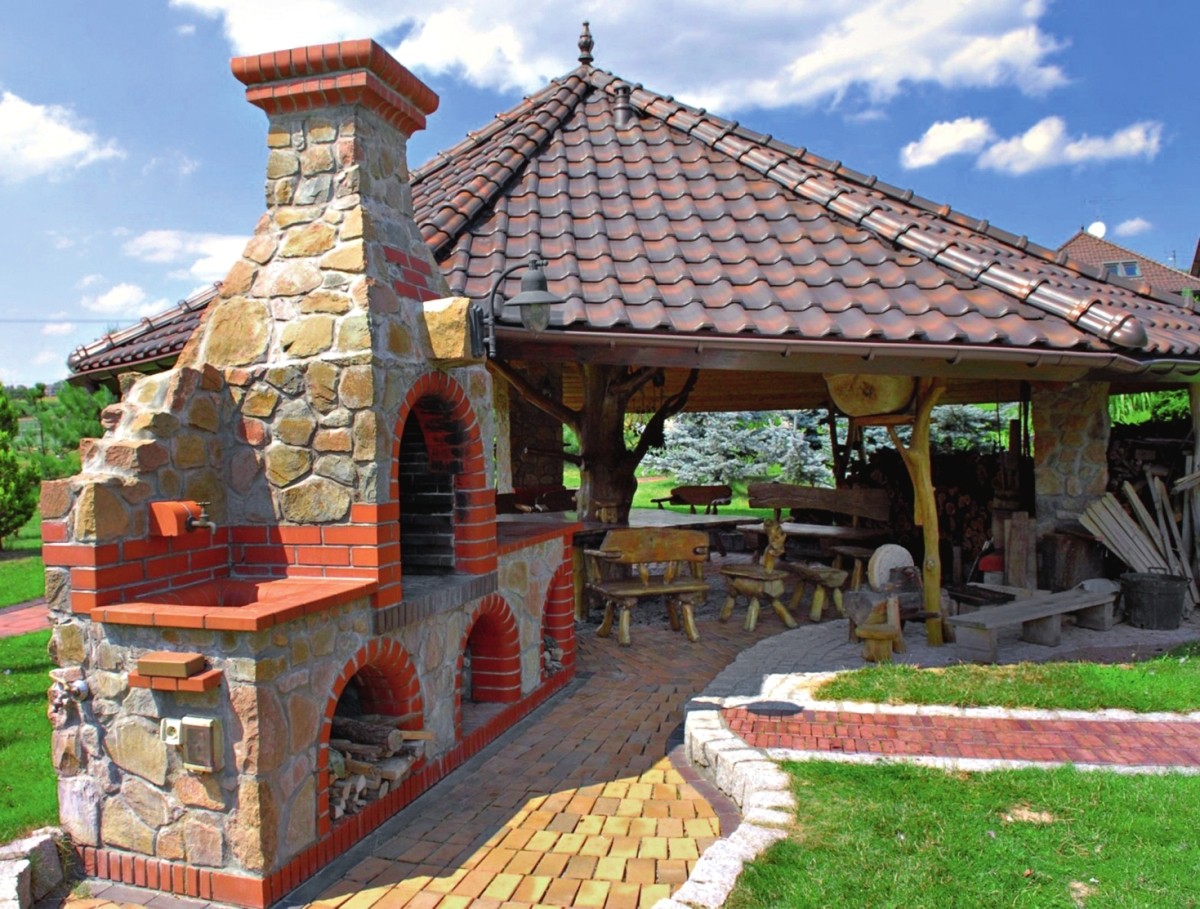
Gazebo and garden oven
Essential: a garden gazebo will benefit from lighting, an electrical outlet for a kettle, blender, toaster, and a tap with drinking water. The floor can be “warm” (wooden) or “cold” (stone).
Tip: To make a classic multifaceted or round gazebo look original and unique, change the angle of its roof slightly or use a special roofing material.
Garden rooms
Garden rooms can visually enlarge even a small area. Could you not believe it? Try dividing your garden into several enclosed areas and see their magical effect for yourself. The walls of these “rooms” are pergolas, arches, and trellises, and part of the green space can be enclosed with a screen, curtain, or glass frame. Wooden walls, openwork nets, and partitions serve as an excellent support for climbing plants and flower arrangements. This fantastic design can give you two completely different sensations at the same time: a closed space and unity with nature.
You can arrange anything here: a summer kitchen and dining room, a veranda and living room, a children’s room and a study. Accordingly, water and electricity must be supplied to the site to connect lamps, insect repellents, outdoor heaters, even laptops and TVs, and other electrical appliances. Of course, many of these cannot be left outdoors for long periods of time. But remember that furniture placed within green walls should not be afraid of water.
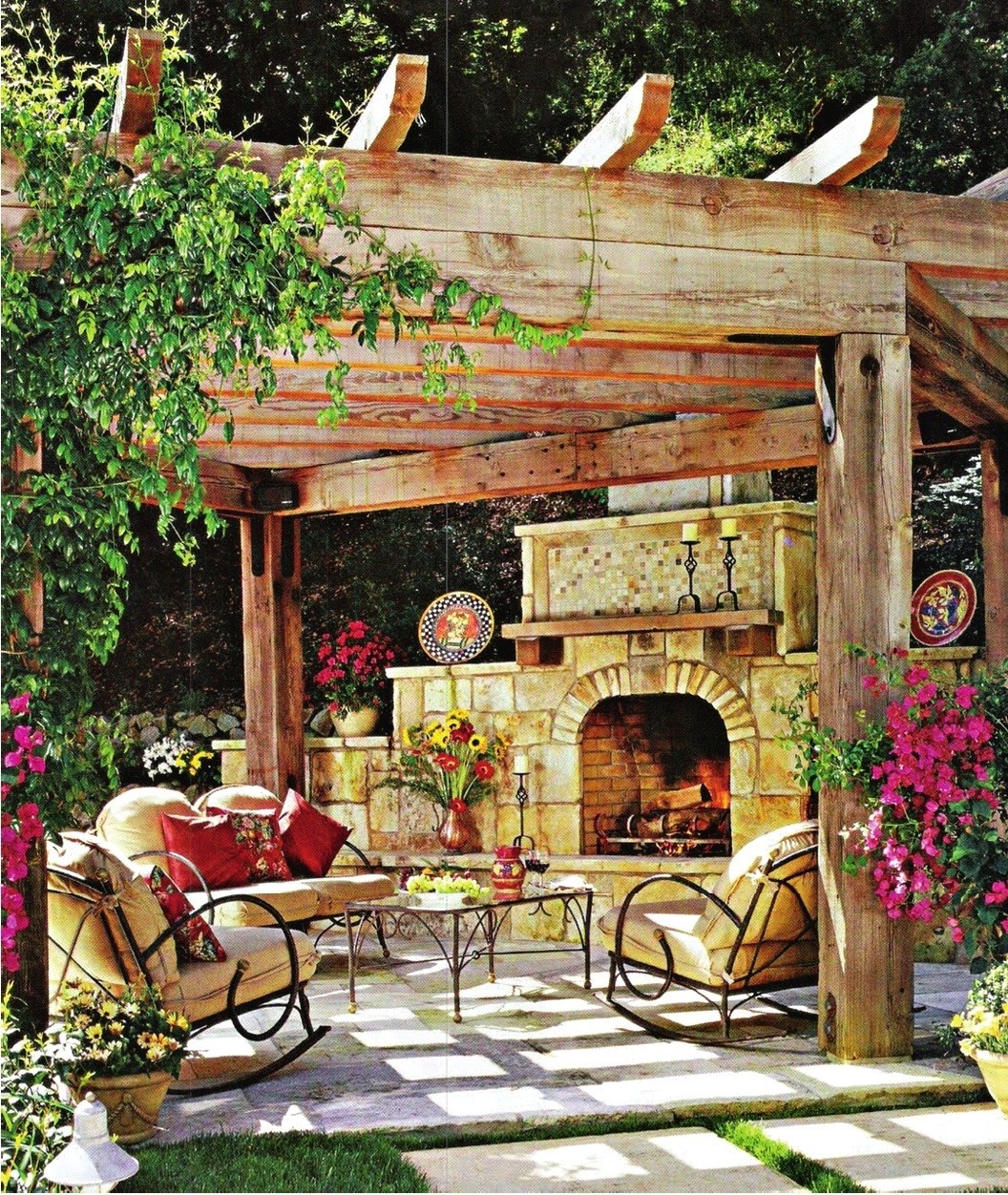
Remember that furniture placed within green walls should not be afraid of water.
Green “construction” does not require sophisticated equipment or special technologies. All you need is time and a clear plan for planting the crops selected for this purpose. The easiest way is to grow a trellis from young trees—plantings that, as a result of grafting, bending, and pruning, turn into a continuous living wooden lattice covered with foliage.
Build and decorate
Distribute relaxation areas throughout the site so that every corner is bustling with life. But do not set up relaxation areas near the wall of the house or the fence, especially if it is solid and high.
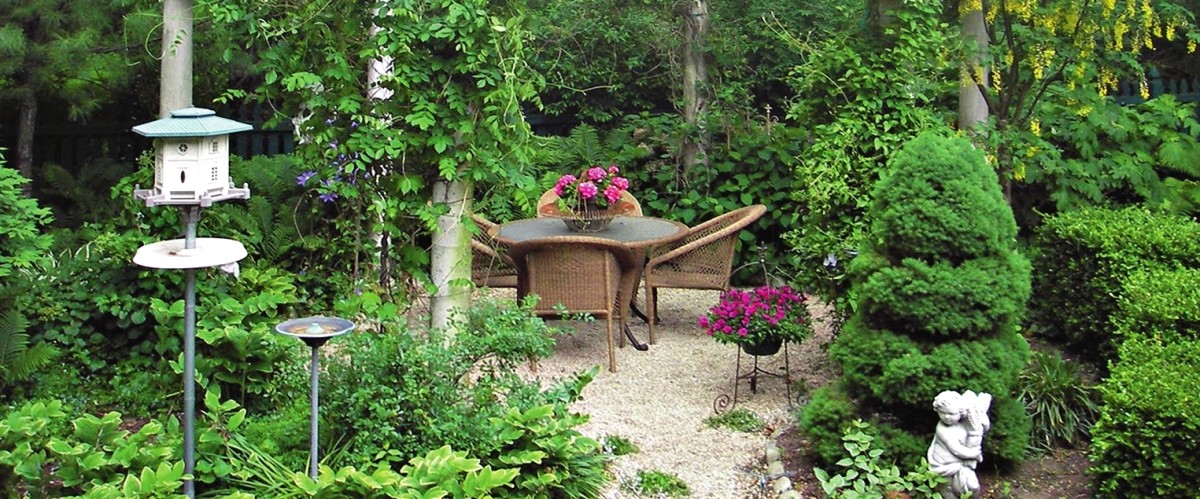
Distribute rest areas throughout the site.
It is better to relax among flowers and greenery.
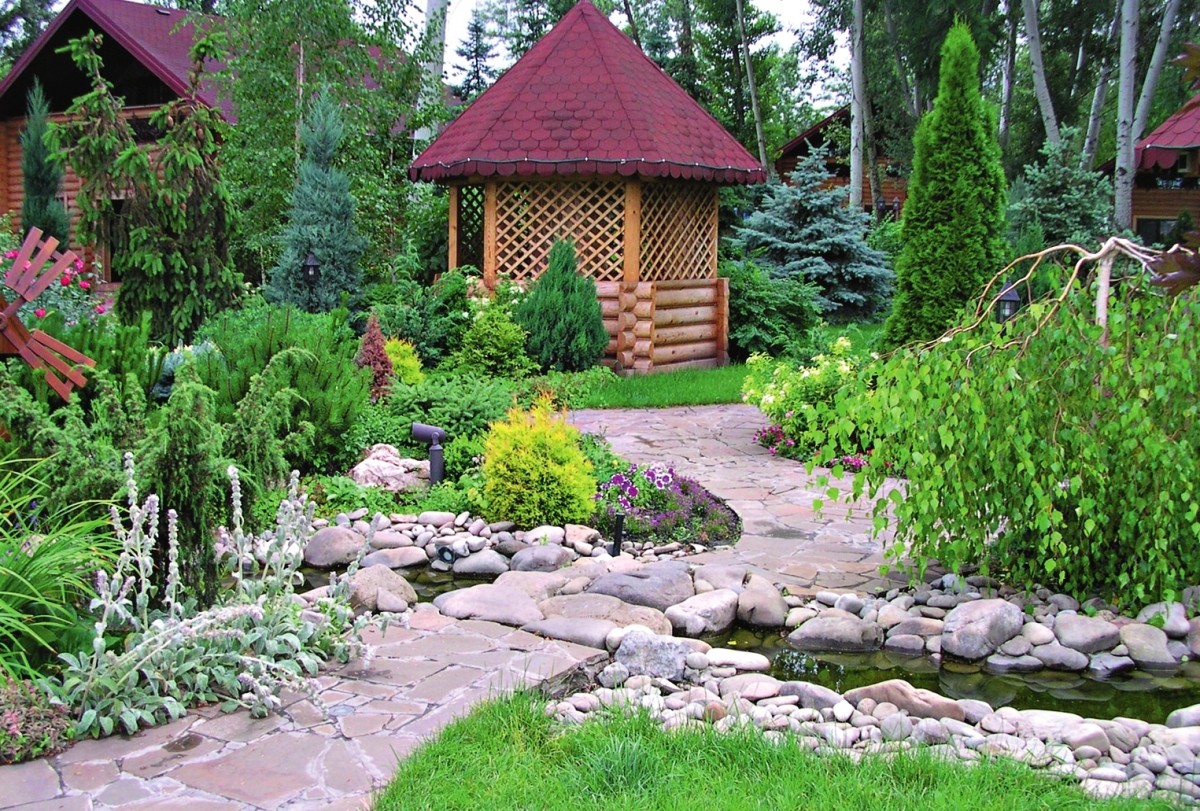
It’s better to relax among flowers and greenery.
Place fragrant flower beds, mini ponds, fountains, or alpine slides near the recreation area.
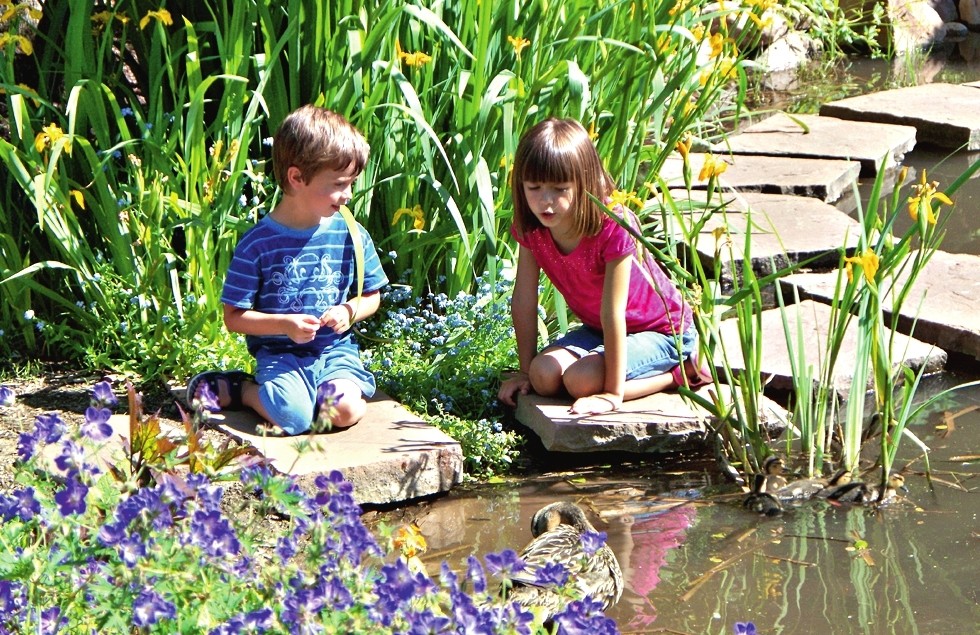
Place fragrant flower beds, mini ponds, and fountains or alpine slides near the recreation area.
❓ Questions and answers
What furniture is best suited for a garden relaxation area?
The choice of furniture depends on the style of your garden and your personal preferences. Popular options include wooden or metal benches, swings, hammocks, and wicker chairs. The furniture must be comfortable and weather-resistant.
How can I add comfort and atmosphere to my garden relaxation area?
To create a cozy atmosphere, you can use decorative elements such as soft pillows, blankets, candles, lanterns, and fountains. It is also recommended to add plants in pots or vases to liven up the space and create harmony with nature.
Do you need protection from rain and sun in the recreation area?
Yes, for a comfortable rest, it is recommended to install a canopy, gazebo, or awning to protect from rain and sun. This will allow you to use the recreation area at any time of the year and in any weather.
How to care for a relaxation area in the garden?
Regular maintenance of the relaxation area includes cleaning furniture, watering plants, removing debris, and keeping things tidy. It is also important to periodically check the condition of awnings and other structures to ensure their safety and durability.
Olivia Harper: Expert in outdoor decor and landscape design. I can help you transform your yard into a cozy living space under the open sky.
See also
How to store apples at home in winter: methods and tips for storage
9 ideas for storing seasonal shoes and clothes
A tall hedge instead of a fence. How to create and maintain it
How to plant irises: choosing a variety, timing, rules, and a visual planting diagram

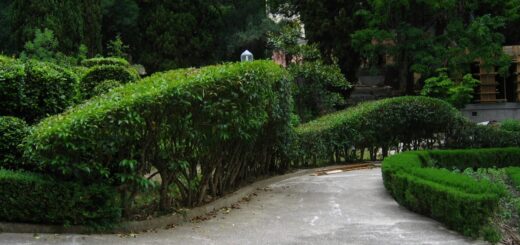

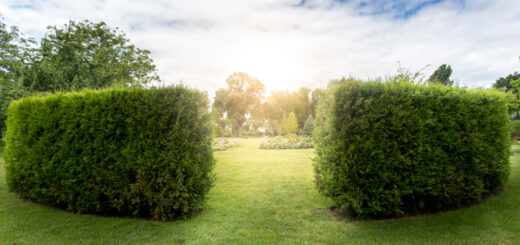










22 Responses
[…] A place to relax: how to organize a rest area […]
[…] A place to relax: how to organize a rest area […]
[…] A place to relax: how to organize a rest area […]
[…] A place to relax: how to organize a rest area […]
[…] A place to relax: how to organize a rest area […]
[…] A place to relax: how to organize a rest area […]
[…] A place to relax: how to organize a rest area […]
[…] A place to relax: how to organize a rest area […]
[…] A place to relax: how to organize a rest area […]
[…] A place to relax: how to organize a rest area […]
[…] A place to relax: how to organize a rest area […]
[…] A place to relax: how to organize a rest area […]
[…] A place to relax: how to organize a rest area […]
[…] A place to relax: how to organize a rest area […]
[…] A place to relax: how to organize a rest area […]
[…] A place to relax: how to organize a rest area […]
[…] A place to relax: how to organize a rest area […]
[…] A place to relax: how to organize a rest area […]
[…] A place to relax: how to organize a rest area […]
[…] A place to relax: how to organize a rest area […]
[…] A place to relax: how to organize a rest area […]
[…] A place to relax: how to organize a rest area […]